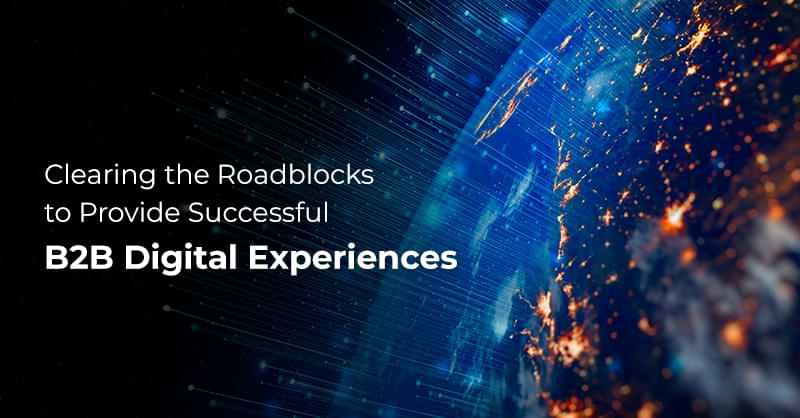Clearing the Roadblocks to Provide Successful B2B Digital Experiences

Written by Poonam Chandersy
Technical Content Writer
October 17, 2022
Analysts claim that business-to-business (B2B) digital experiences closely align with the market-differentiating business-to-consumer (B2C) experiences. These experiences condition businesses to expect that same level of digital excellence when they interact with their vendors.
However, upon delving deeper, essential differences emerge in business users’ digital experience requirements. As a result, B2B brands must work through additional considerations as they look to improve the customer experience, they offer to business partners. In this blog, we will highlight these differences and then detail how your organization can address them to offer business users the best possible digital experience.
Differences Between Business Users and Individual Consumers
So, what makes a B2B digital experience different from a B2C experience? Below are three of the main differences:
Collective Approach to Buying Decisions
According to Harvard Business Review, the average number of people involved in the purchase of B2B solutions is more than six. While multiple representatives from research and competitive analytics to budget experts and payment authorization teams are involved, B2B customers are informed, connected, and risk-conscious. The main goal is to make the best decision based on their business needs and not their personal preferences.
With time, these decisions are evolving to rely more on relevant digital engagements. A survey by Demandbase found that 75% of B2B buyers cited that relevant content that spoke directly to their company was of utmost importance when they visited vendor websites. For B2B businesses to win market share, digital content must be relevant and make business sense to various stakeholders.
Performance-tied Digital Experiences
Making decisions with multiple choices can prove to be a stressful task. For business users, this stress is magnified as they have to account for all the interactions between business users and vendors from the supply chain to eCommerce stages, which can directly impact the user’s job performance. In addition, businesses must ensure that the reports are complete, quotas filled, price targets met, budgets adhered to, and spending limits complied with, among many other tasks. If the product or service they work with does not meet their needs by providing seamless and consistent access to resources, they will look elsewhere for efficient solutions and services.
McKinsey & Company surveyed B2B decision makers and found that 86% of respondents preferred using self-service tools to reorder rather than talking to a sales representative. If the digital experience can make reordering fast and easy, you’ll stand apart from competitors who still need to produce a quote, fill out paper order forms or require a phone call for an order status update.
Added Security and Privacy
Apart from personal data protected by privacy regulations like the European Union (EU) General Data Protection Regulation (GDPR) and the recent California Consumer Privacy Act (CCPA), businesses also accumulate private information such as contracts, pricing, inventory, and much more.
Organizations need to access this private information on an ever-increasing number of devices and platforms but can do so only as much as their access level justifies. Business partners tasked with setting up access policies need to have the ability to map entitlements and authorizations relevant to the business needs. This relationship can also be put at risk if that access management becomes too cumbersome. At the same time, if the authorization is not secure, the wrong people can access this private information, opening up the company to lawsuits and criminal action and causing severe damage to the brand’s reputation.
Features of a Trusted B2B Digital Experience
Given these essential differences, businesses question how they can improve the digital experiences offered to business partners. The answers lie in the points highlighted below:
Personalized Experiences
During the research phase, companies offering personalized content to prospective clients gain a significant advantage over competitors offering only generic experiences. This is because they can employ a solution for enterprise-wide profile, preference, and consent data management to drive the delivery of market-differentiating personalization. As a result, they deliver content based on the user’s preferences while respecting data privacy.
Customer Data Management
Businesses are placing Customer Data Management at the center of their technology stacks to build a single view of each customer. This powers the content strategy delivered through web, email, and various speaker events — assisting in creating personalized customer experiences.
This data delivers beyond the initial B2B buyer journey. As the relationship grows, the sales opportunities rise if the vendor acts more like a specialized industry consultant rather than a product seller. Making this shift requires a proper understanding of the business buyers, global trends, local challenges, and potential market opportunities created by the partnership. Customer data management is key to gaining and applying this understanding during digital engagements with business prospects.
Digital Ecosystem
With appropriate points of entry into the digital ecosystem are crucial. For example, business users need access to their content and services on various devices and platforms. They also need seamless registrations and login flows to the resources appropriate for their access levels.
This means easily configurated, pre-defined, and policy-based access management is essential. In addition, organizations need a system to securely identify business partner users from any touchpoint with various authentication factors, including single sign-on (SSO), federation standards, and social media credentials.
Business users trust vendors if their experiences are personalized with data from their unique profiles. To achieve personalization, businesses need a strategy to provide accurate identity data management for partner administrators with the ability to modify the experiences as the users change regions, jobs, or roles.
Data Privacy
Data privacy is another major factor in business relationships. Headed by the GDPR, the global trend toward heightened consumer data privacy has raised awareness of how companies collect and use their data. The trust is broken if they use it without the user’s knowledge or consent. In addition, they expect to have control over the profiles, preferences, and consent data, marking a significant shift for B2B brands.
As displayed in the images, businesses use their compliance initiatives as a springboard to build trust. They are redefining data management practices to manage user preferences and consent settings, as opposed to managing multiple silos of data. They are improving transparency by implementing customizable and out-of-the-box workflows to present explicit consent requests for terms of service, privacy policies, cookie consent for ePrivacy, marketing communications, or other permission-based activities. They also offer businesses to capability to manage profile information, preferences, and consent settings using a self-service center accessible through their account profile on any device or platform.
With these innovations, B2B brands are doing more than protecting the business from regulatory risks. They are saving costs by reducing the need for service and call center resources as they centralize and automate business partner preferences and consent management processes. This further enhances business partners’ relationships by providing them with control of their data and preferences.
Conclusion
Now that we know the roadblocks, Royal Cyber has the strategies to address them. While leveraging advanced technologies to deliver a seamless experience, keeping track of the process during all phases of the engagement is essential. SAP Customer Solutions helps businesses harness the power of personalization to attract and retain businesses. Royal Cyber is a gold SAP Commerce Cloud partner and implements the best practices and techniques to deliver phenomenal experiences. Contact us to find out how we can help your business grow using customer data correctly.
Recent Blogs
- An Insight into ServiceNow Hardware Asset Management (HAM) Ramya Priya Balasubramanian Practice Head ServiceNow Gain …Read More »
- Learn to write effective test cases. Master best practices, templates, and tips to enhance software …Read More »
- In today’s fast-paced digital landscape, seamless data integration is crucial for businessRead More »




